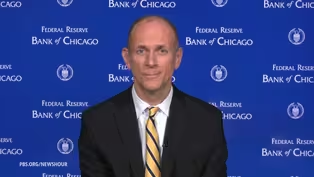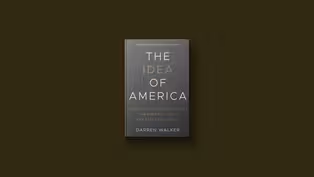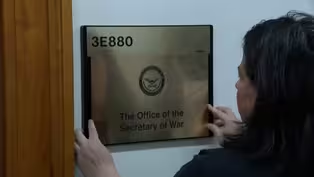
How AI is driving a sharp rise in electricity bills
Clip: 9/5/2025 | 6m 19sVideo has Closed Captions
How AI infrastructure is driving a sharp rise in electricity bills
Electricity bills are climbing nationwide, rising faster than inflation in many places. The explosive growth of AI and the massive data centers behind it are driving demand and straining the grid. To explain how this hits consumers, and what can be done, Geoff Bennett spoke with Ari Peskoe, director of the Electricity Law Initiative at Harvard Law School.
Problems playing video? | Closed Captioning Feedback
Problems playing video? | Closed Captioning Feedback
Major corporate funding for the PBS News Hour is provided by BDO, BNSF, Consumer Cellular, American Cruise Lines, and Raymond James. Funding for the PBS NewsHour Weekend is provided by...

How AI is driving a sharp rise in electricity bills
Clip: 9/5/2025 | 6m 19sVideo has Closed Captions
Electricity bills are climbing nationwide, rising faster than inflation in many places. The explosive growth of AI and the massive data centers behind it are driving demand and straining the grid. To explain how this hits consumers, and what can be done, Geoff Bennett spoke with Ari Peskoe, director of the Electricity Law Initiative at Harvard Law School.
Problems playing video? | Closed Captioning Feedback
How to Watch PBS News Hour
PBS News Hour is available to stream on pbs.org and the free PBS App, available on iPhone, Apple TV, Android TV, Android smartphones, Amazon Fire TV, Amazon Fire Tablet, Roku, Samsung Smart TV, and Vizio.
Providing Support for PBS.org
Learn Moreabout PBS online sponsorshipGEOFF BENNETT: Tech leaders from some of# the country's biggest companies met with## President Trump at the White House last night,# promising hundreds of billions of dollars to## accelerate artificial intelligence# and the infrastructure to power it.
They also offered unusually lavish praise# for the president at a moment when many## in the industry are pressing for a# hands-off regulatory approach.
It's## all unfolding as electricity bills climb# nationwide, rising faster than inflation## in many places and in some regions far more# sharply.
The explosive growth of A.I.
and## the massive data centers behind it are# driving demand and straining the grid.
To explain how this hits consumers and what can# be done about it, I spoke earlier with Ari Peskoe,## director of the Electricity Law# Initiative at Harvard Law School.
So, electricity prices are surging# nationwide.
To what extent is the## rapid expansion of A.I.
and those# data centers driving up those costs?
ARI PESKOE, Electricity Law Initiative# Director, Harvard Law School: So, the## rise of these industrial-scale co.. other Internet applications is certainly# one of the factors driving up prices.
And I think there's a chance that A.I.
is# going to drive our bills even higher in## the future.
And there's a couple of# reasons for that.
One is that these## facilities are using so much energy that# utilities are building billions of dollars## of infrastructure to support them and# spreading those costs to all of us.
And the second reason is that# there are energy markets where## utilities buy their power.
And because demand# from these A.I.
energy centers is booming,## it's driving up prices, and we're# all paying those higher prices.
GEOFF BENNETT: And some regions are# getting hit harder than others.
The## nationwide average increase is around# 6 percent, compared to as high as## 14 percent in places like New Jersey and# New York.
What explains those disparities?
ARI PESKOE: Well, a lot of our electricity bill# increases are due to decisions being made by your## local utility.
Three out of four Americans receive# electricity service from a for-profit company## that makes money by investing in infrastructure,# such as power lines and other related assets.
And so a lot of utilities have been replacing# power lines on their aging systems and investing## in new infrastructure.
And that's been driving# up bills.
But different utilities are making## different investment decisions, and that explains# some of the disparity around the country.
GEOFF BENNETT: I'm sure there are people who will# hear you say that and they will ask the question,## shouldn't the tech companies that are profiting# from these data centers and the A.I.
advances,## shouldn't they be the ones to# fit the bill?
Why are everyday## Americans being forced to pay these higher costs?
ARI PESKOE: That's exactly the# right question to be asking.
But the business model of the utility# industry for now more than 100 years has## been to invest in their systems and then# spread those costs for everyone.
That's## always thought to be the fair approach# to supporting our electricity system.
And when you think about it, in a lot# of ways, that is fair.
So, for example,## if there's a storm in your neighborhood and a# tree falls on a power line and the lights go## out in your neighborhood, the utility comes to# fix that, but it doesn't bill you and everyone## in your neighborhood for that.
Rather, it# spreads the cost of those repairs to everybody.
And that you know is seen to be fair,# because certainly you did nothing wrong## when that tree falls down.
And so that# idea of spreading costs through everyone,## when the utility needs to expand the system, it# doesn't just charge the new residences or new## businesses that are joining the system, but,# again, it spreads those costs to everyone.
We're in a bit of a new situation here# when you have individual facilities,## these data centers, that are using# as much electricity as large cities,## and they happen to be supporting the wealthiest# corporations in the world.
I think we need to## revisit some of these fundamental assumptions# behind how we share the costs of our power system.
GEOFF BENNETT: So much of this data center# build-out is relatively new.
Should we be## bracing for even higher prices in the years# ahead or are we already seeing the peak?
ARI PESKOE: I think it's certainly# possible that the costs of this data## center expansion are going# to increase for everyone.
And that's because this -- data centers have been# part of the backbone of our Internet for some time## now, but the size of these facilities has just# so vastly expanded since the introduction of## ChatGPT just a few years ago really kicked# off this wave of, again, these city-sized## data centers that we have never seen before.# And many of them are still in development.
So the costs of all the infrastructure and energy## associated with them really# haven't hit our bills just yet.
GEOFF BENNETT: And, of course, the# Trump administration is pushing coal,## natural gas, nuclear power to# meet the A.I.-driven demand,## while kind of moving away from renewable# energy, like wind and solar.
Do you## see that approach as addressing the core# challenge posed by the rising energy needs?
ARI PESKOE: No, I mean, it doesn't make any# sense to take supply options off the table.## And that's really what this administration# is doing, particularly with wind energy.
We really need every option we can to boost the# amount of electricity if we're going to power## these new computing facilities.
And, as I said,# demand is rising, and that's causing prices to## go up in many markets around the country.# When demand goes up, you want to increase## supply as well.
And under basic economics,# that's going to even out some of the prices.
But it doesn't make any sense what they're doing.
GEOFF BENNETT: So, higher bills are here to stay?
ARI PESKOE: That's certainly the# trend that we're seeing right now.
And all the trend lines are unfortunately# pointing in the wrong direction## for consumers.
So it would be nice to see, again,## let's put more supply options on the table that'll# help alleviate some of the stress we're seeing.
And, in addition, we have to be able to get more# juice out of our current system.
We have to have## the utility industry operate it more efficiently,# so rather than just building more and more and## more, we're actually able to use what we have# in a more efficient, cost-effective manner.
GEOFF BENNETT: Ari Peskoe, director# of the Electricity Law Initiative## at Harvard Law School, great# to speak with you.
Thank you.
ARI PESKOE: Thanks so much.
Abandoned Afghan allies share fears of life under Taliban
Video has Closed Captions
Clip: 9/5/2025 | 6m 46s | 'We gave everything’: Afghan allies abandoned by U.S. share fears of life under Taliban (6m 46s)
Brooks and Bouie on economic warning signs
Video has Closed Captions
Clip: 9/5/2025 | 10m 57s | Brooks and Bouie on economic warning signs (10m 57s)
Chicago Fed president unpacks weak jobs report
Video has Closed Captions
Clip: 9/5/2025 | 9m 36s | Chicago Fed president unpacks weak jobs report and what it says about the economy (9m 36s)
Darren Walker explores inequality and democracy in new book
Video has Closed Captions
Clip: 9/5/2025 | 7m 37s | Darren Walker explores inequality and democracy in 'The Idea of America' (7m 37s)
Does it make sense to keep minting the penny?
Video has Closed Captions
Clip: 9/5/2025 | 3m 45s | Does it make sense to keep minting the penny? (3m 45s)
News Wrap: Trump signs Department of War order
Video has Closed Captions
Clip: 9/5/2025 | 6m 58s | News Wrap: Trump signs order aimed at renaming Defense Department as Department of War (6m 58s)
Providing Support for PBS.org
Learn Moreabout PBS online sponsorship
- News and Public Affairs

FRONTLINE is investigative journalism that questions, explains and changes our world.

- News and Public Affairs

Amanpour and Company features conversations with leaders and decision makers.












Support for PBS provided by:
Major corporate funding for the PBS News Hour is provided by BDO, BNSF, Consumer Cellular, American Cruise Lines, and Raymond James. Funding for the PBS NewsHour Weekend is provided by...





